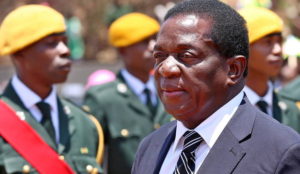In a bid to revive the southern African nation’s battered economy, Finance Minister Patrick Chinamasa has proposed a series of measures to attract foreign investment, along with tax concessions to local businesses.
But Nelson Chamisa, a leader of the Movement for Democratic Change Alliance, the country’s largest opposition coalition of seven political parties, has warned that this strategy could be hampered by the joint police-army patrols that began after a military operation was launched on November 15, targeting “criminals” associated with Mugabe.
“The continued occupation of the streets by the army scares away investors. It does not inspire confidence,” Chamisa said at a news conference in the capital Harare on Friday.
Former Finance Minister Tendai Biti expressed scepticism that the 4.5% growth prediction could be achieved in 2018 and called for more severe cuts to government expenditures in order for the administration to operate within the $5.7bn budget.
Police roadblocks
An internal split within the ruling Zanu-PF sparked a military takeover on November 15 that saw Mugabe step down after 37 years in power. Members of the army and police continue to monitor roadblocks and strategic government sites.
Despite criticism, Chinamasa appeared optimistic as he unveiled a raft of strategies to address corruption and the lack of fiscal discipline that typified the former regime.
Key among the changes to woo investors is a revision of the indigenisation law, a cornerstone of the Mugabe regime. The controversial policy requires 51/49 percent ownership in favour of black Zimbabweans as majority shareholders in companies worth more than $500,000; however, from April 2018, indigenisation will be restricted to the diamond and platinum extractive industries.
Simbarashe Mhuriro, the managing director of Oxygen Africa, a renewable energy company partnered with a Swiss enterprise, Meeco Invest AG, welcomed the policy shift.
“The change in the indigenisation policy means a big change for us. Under indigenisation, the foreign investor could only have a 49 percent stake and they would make less return on their money,” he told Al Jazeera.
“However, with the recent changes, it means the investor assumes a bigger risk, but at the same time, big developers can get real value on their dollar across different industries. This may encourage other investors to take a look at Zimbabwe again.”
In his budget speech, Chinamasa announced that more than 3,000 jobs in the youth service would be cut. Months before his resignation, Mugabe had ordered the reinstatement of youth and gender officers in rural areas, but they have often been accused of campaigning on behalf of ZANU-PF.
In the past, Mugabe has been reluctant to cut the bloated civil service, whose salaries consume at least 90 percent of the budget. With $5.1bn budgeted for public expenditures in 2018, Mnangagwa’s administration has promised to trim the civil service and retire workers over 65 from January, while benefits to top officials will be reduced.
Tax breaks
The government has also proposed corporate income tax breaks for the energy sector. Companies involved in power generation will be exempt from paying income tax for five years, after which they will be subject to a 15 percent charge.
Mhuririo, whose Oxygen Africa is currently pursuing a joint venture to build solar farms across Zimbabwe, said that if implemented, the tax break could translate to lower electricity rates for consumers. Earlier this year, the partnership received a $1m grant from the African Development Bank’s Sustainable Energy Fund for Africa towards further project development.
In his address, Chinamasa also offered a tax amnesty on debts acquired prior to December 1; interest and penalties accrued on the debt would be written off if taxpayers settled their debts on or before June 30, 2018.
In the second city of Bulawayo, which in its heyday was the base of Zimbabwe’s manufacturing industry, people listened to the budget on their car radios and gathered around television sets in some shops as Chinamasa’s address was broadcast live. Local businessman Ernest Mpofu, 65, said the tax reprieve was a welcome move.
“I feel very encouraged by the measures the government has made, especially with the tax amnesty. It means businesses can now work towards settling their principal debts instead of battling to pay accumulated interests and penalties,” he said. “This could free up capital for many businesses, and I hope the local authorities will take the same approach when it comes to settling debts on water and rates.”
The tax pardon comes on the heels of a 90-day amnesty window for the repatriation of public funds taken out of the country through illegal means. According to a statement issued by Mnangagwa last week, the relief would apply until February 1, 2018, after which individuals and companies still in possession of illicit funds could be liable to prosecution.
Vince Musewe, an independent economist, said he was “disappointed” the government did not announce “an emergency rescue plan” to supply money to the banks and avert the liquidity crisis causing cash shortages that have seen ordinary Zimbabweans sleeping outside banks since 2016.
If the economy is to grow at Chinamasa’s predicted 4.5% rate, practical implementation of the government’s proposals is key, he added.
“Industrial recovery can never happen without some real concessions being made to business and, if done, these measures could inspire confidence in the local and foreign business community to show that the government is actually trying to do things differently,” he said.
Post published in: Featured


